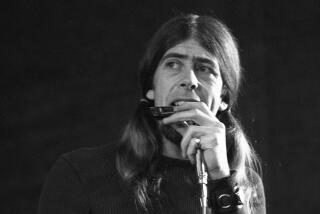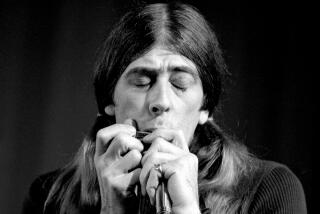John Clayton Jr.--the Traveling Bass Player and Composer : Jazz: He tours, records and teaches--and finds time to campaign for the black musician.
- Share via
John Clayton Jr. is rapidly becoming one of the most internationally respected bassists and composers and with good reason, when you consider his credits.
As a jazzman, he’s played with the Count Basie Orchestra and pianist Monty Alexander; as a classicist, he served as principal bassist with the Amsterdam Philharmonic for five years.
As a bandleader, he co-leads the Clayton-Hamilton Orchestra with his brother, saxophonist Jeff Clayton, and drummer Jeff Hamilton. The group, which made one of its rare appearances Monday at the Biltmore Hotel’s Grand Avenue Bar, has two albums due out next week: an instrumental set on Capri Records and one backing singer Ernestine Anderson on Concord. The brothers also co-lead a quintet, which appears tonight at the Indigo Jazz Club in Compton.
As a composer and arranger, Clayton went to West Germany three times last year, mainly to write music for the Cologne Radio Orchestra. He also contributed works for Doc Severinsen’s Tonight Show Orchestra, and for six weeks--which he describes as “my write-till-I-drop period”--wrote dozens of arrangements for the Gene Harris Phillip Morris Superband, prior to its 1989 world tour.
Clayton said his current inspiration as a writer is Academy Award winner Johnny Mandel. “I have to learn how to work with synthesizers and computers,” Clayton said, “and Johnny has been my mentor, just as Ray Brown was when I was studying the bass. Henry Mancini helps me too.”
In between writing assignments, Clayton’s life as a touring and recording musician, and as a bass teacher, goes on unabated. In the past year he has toured Holland with pianist Alexander, gigged with John Collins, Benny Carter, Bud Shank, Carmen McRae and Nancy Wilson, and recorded with Rosemary Clooney and Mancini. He also took part in a series of instructional videos along with fellow bassists Ray Brown, Milt Hinton and Francois Rabbath, the French classical virtuoso.
Perhaps enough is enough. “For the next year,” he said, “I really have to cut down on the traveling. With these albums coming out, I want to establish the big band, and work on writing projects in Los Angeles. Of course, I can still go back to Germany when they need me.”
Born in Los Angeles in 1952 into a musical family--”My mother still is a wonderful pianist and conducts church choirs”--the tall, personable Clayton began his bass studies with Ray Brown at 16. Only three years later, he was the bassist on the TV series “The Mancini Generation.” He gave up the series to complete his studies at Indiana University; then came two seminal years as he toured the United States and Europe with Monty Alexander. The Basie gig came next.
“After leaving Basie, I moved to Holland, but I flew right back to take part in the finals of the National Black Music Colloquium and Competition,” he said. “I tied with a viola player for first place in the strings division. But meanwhile, I had auditioned for the Amsterdam Philharmonic, so I went right back and started there.”
Widely accepted though he is on the Los Angeles music front, Clayton is disturbed by a lingering racism he finds all around him.
“It’s really sad. I’ll look around in a studio and see that I’m the only black player in the whole place, out of maybe 60 musicians,” he said. “It’s the same with big jazz bands; it’s shocking to me that anyone could have a big band in Los Angeles and go on and on for years without even accidentally having a single black player.
“Given the number of black jazz musicians who are capable, anxious and willing, this situation is ludicrous. It’s important to reach out to the young black players and open the door for them.
“I could shrug my shoulders and say, ‘Well, that’s the way it is; nobody says the music business is fair.’ But if I do that, things will only get worse, so I can’t ignore the situation.”
Given his widespread credits in playing and writing, in classical and jazz, what does Clayton hope for in his future?
“I’d like to spend 40% of my time playing jazz bass, 40% composing, and 20% playing classical music,” he said. “My loves are playing bass, in any style or capacity, and writing music; so as I have my bass or my pen in my hands, I’m happy.”
More to Read
The biggest entertainment stories
Get our big stories about Hollywood, film, television, music, arts, culture and more right in your inbox as soon as they publish.
You may occasionally receive promotional content from the Los Angeles Times.








